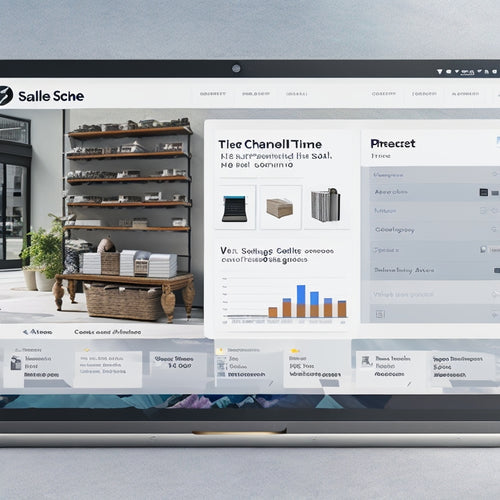
Bolstering Retail Security During Festive Shopping Frenzy
Share
During the festive shopping season, retailers must enhance security measures to safeguard customers' sensitive information and prevent revenue loss due to fraud. With increased transactions and promotions, cyber threats and fraudulent activities surge. To mitigate risks, prioritize robust security strategies, optimize checkout processes, and protect promo codes from abuse. Vigilance against promotional abuse, tokenization, and multi-factor authentication are also pivotal. By implementing these measures, retailers can protect their revenue and reputation. To guarantee a secure and profitable festive season, it is imperative to stay ahead of potential threats and implement thorough security protocols.
Key Takeaways
• Implement a robust security strategy to safeguard customer information during the holiday season.
• Optimize checkout processes to reduce friction, decrease cart abandonment rates, and prevent promotional abuse.
• Protect revenue from fraudsters by implementing promo code protection, guaranteeing shipping security, and enhancing transaction safeguards.
• Encrypt sensitive information and implement robust authentication measures to secure transactions and prevent data breaches.
• Regularly update security patches and protocols to prevent financial losses and safeguard revenue and reputation.
Holiday Season Security Essentials
As the holiday shopping frenzy approaches, retailers must prioritize a robust security strategy to safeguard their customers' sensitive information and prevent fraudulent transactions.
This includes checkout optimization to reduce friction and guarantee a seamless experience for customers. A well-optimized checkout process can greatly decrease cart abandonment rates, resulting in increased revenue for retailers.
Additionally, retailers must be vigilant against promotional abuse, where customers exploit discount codes and other offers. To prevent this, retailers can implement measures such as enforcing expiration dates, user logins, or purchase requirements for promo codes.
Protecting Revenue From Fraudsters
Fraudulent transactions can greatly erode retailers' revenue during the holiday season, making it crucial to implement robust fraud prevention strategies that protect both customers and businesses from financial losses.
To safeguard revenue, retailers should:
-
Implement promo code protection by making intended codes easily accessible and enforcing expiration dates, user logins, or purchase requirements to prevent abuse.
-
Guarantee shipping security by providing a virtual paper trail of shipments, clearly stating expected delivery dates, and tracking shipments to reduce credit card chargebacks and fraud.
-
Enhance transaction safeguards by utilizing tokenization for secure payment processing, implementing multi-factor authentication, and regularly updating security patches on the website.
Securing Transactions and Data
Retailers must prioritize securing transactions and data by encrypting sensitive information, implementing robust authentication measures, and regularly updating security protocols to prevent data breaches and financial losses.
Data encryption is vital to safeguard customer information, while transaction authentication ensures that only legitimate transactions are processed. Implementing multi-factor authentication and tokenization can further enhance transaction security.
Regular security patches and updates are also essential to prevent vulnerabilities. By prioritizing transaction and data security, retailers can mitigate the risk of fraud and financial losses, ultimately safeguarding their revenue and reputation.
Frequently Asked Questions
How Can Retailers Balance Security With Seamless Customer Checkout Experiences?
As the checkout process becomes a delicate dance between security and seamlessness, retailers must strike a balance by implementing a streamlined process that prioritizes a personalized experience, ensuring customers feel protected without sacrificing convenience.
What Are the Consequences of Not Implementing Fraud Prevention Measures?
Failure to implement fraud prevention measures can result in severe consequences, including reputation damage from compromised customer data and significant financial losses from chargebacks, legal fees, and remediation efforts, ultimately impacting a retailer's bottom line and brand trust.
Can Retailers Completely Eliminate Fraud During the Holiday Season?
'It's a pipedream to think fraud can be completely eradicated, but retailers can aim for a Zero Tolerance approach. Acknowledging the Fraud Reality, they must implement robust measures to minimize losses, staying vigilant and proactive in the face of evolving threats.'
How Often Should Retailers Update Their Fraud Prevention Strategies?
Retailers should update their fraud prevention strategies regularly, ideally quarterly, to adapt to emerging threats and seasonal changes, ensuring seamless security integration and minimizing potential vulnerabilities during peak shopping periods.
What Role Do Customer Education Play in Preventing Online Fraud?
"As the ancient proverb goes, 'forewarned is forearmed.' Customer education plays a pivotal role in preventing online fraud by promoting fraud awareness and secure practices, empowering consumers to recognize and report suspicious activities, thereby reducing the risk of fraud."
Related Posts
-

How Do I Get Social Proof on Shopify
This article explores the concept of obtaining social proof on the Shopify platform. It highlights the benefits of i...
-

7 Ways to Measure ROI on Digital Product Downloads
You can measure the ROI of your digital product downloads by tracking sales and revenue growth to identify trends and...
-

What Can You Automate on Shopify
This article examines the potential for automation on the Shopify platform. It discusses the benefits of automation ...


